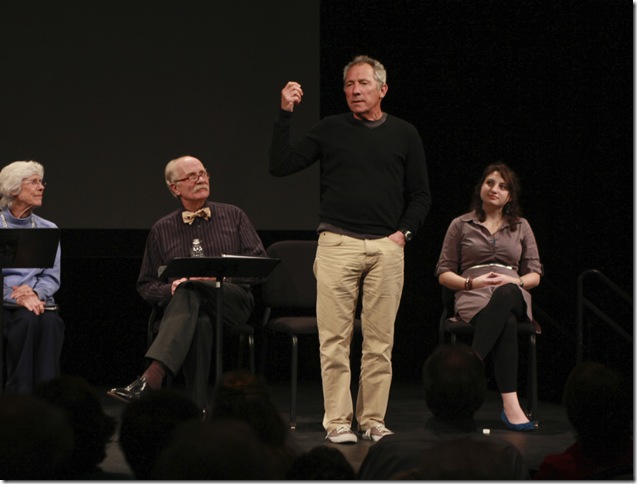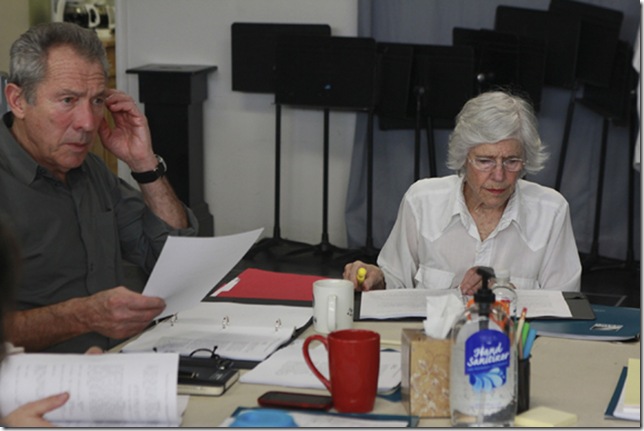Now five years old, Florida Stage’s annual 1st Stage New Works Festival got the most important thing right immediately.
Where too many reading series elsewhere are dead ends for the scripts being unveiled, the West Palm Beach company has been committed to graduating at least a couple of the festival entries to full production each year.
This season, for instance, Florida Stage subscription audiences have already seen or will see Cane, Goldie, Max & Milk and The Cha-Cha of a Camel Spider, all three of which were first heard by the public at last year’s festival. And judging from the just-completed 2011 fest, there is every reason to think that commitment to selecting new work from 1st Stage for subsequent seasons will continue.
Certainly there was quality writing on display at the Kravis Center’s Persson Hall, the black box space across the breezeway from Florida Stage’s new home at the Rinker Playhouse. There, at bare-bones readings — no sets, no costumes, no props, but three dozen of the region’s best actors — seven scripts inched closer towards becoming part of America’s stage literature.
True, producing director Louis Tyrrell hedged his bets a bit by relying on writers that he had produced previously — Lewis, Christopher Demos-Brown, Deborah Zoe Laufer, Andrew Rosendorf and Israel Horovitz — but he also gambled on two artists new to playwriting, actor John Herrera and visual artist Kew Henry.
A nice tweak to the program, probably born out of necessity, caused the readings to be compressed into 51 hours of a weekend, a total immersion that emphasized the festival atmosphere — and probably increased the alcohol intake on the breaks and at the receptions.
Lewis scored with his latest script, The Americans Across the Street, a dark comedy with a wonderful curmudgeon at its center, Pulitzer Prize-winning novelist Derek Slaughterhouse, now late on his deadline to his publisher because he spends most of his time on his front porch, ranting against his neighbors and the world at large.
A plot of sorts kicks in when his estranged, widowed, now destitute sister arrives with her precocious teenage daughter, intending to stay. Among the good news is that they do not soften the old codger much and that acid-tongued Gordon McConnell has, and gives, great fun as Derek. If only Lewis would blue-pencil a lot of a wheezy comic sequence involving hallucinatory mushrooms, the script would be production-ready.
Also ready for prime time is Israel Horovitz’s Beverley, about two former World War II flyboys, one a Yank and the other a Brit, now in their 70s, and the title character, the love of both their lives. After the war, Beverley married the American, and now, 60-some years later, the Brit arrives on their Gloucester, Mass. — Horovitz’s favorite theatrical setting — doorstep to convince her to run, well, walk, off with him. The dramatic tension widens as Beverley‘s West Coast talent agent daughter returns home with all of her built-up resentments from her youth intact.
The results are thoughtful and entertaining, with an added layer of charm at the reading supplied by two-time Tony winner Frances Sternhagen as Beverley. Surely she is reason enough to produce the play whenever her schedule permits.
A Florida Stage discovery, Miami lawyer Christopher Demos-Brown (When the Sun Shone Brighter) brought to the festival a richly comic family reunion play, Captiva. At its center are three grown siblings, the youngest of whom has invited the family to their childhood vacation spot to meet her fiancé. But there is trouble brewing with her relationship, just as there is a hurricane barreling towards them.
The script could use some tightening — a frequent situation this weekend — but Demos-Brown again demonstrates what a smart writer he is and, this time, how funny he can be. If Tyrrell is looking for the next installment is his Florida Cycle, this could be it. It seems unlikely that Demos-Brown will find more spot-on casting than Todd Allen Durkin as the older brother, delivering deliciously snarky punch lines.
Another frequently produced Florida Stage playwright, Deborah Zoe Laufer (The Last Schwartz, End Days), revealed a fascination with computer gamers, those obsessive young adults hooked on strategy-and-reflexes exercises. That has led to Leveling Up, about a quartet of aimless souls, one of whom is recruited by the National Security Agency to “play” their similar, but real, war games. The way it plays out in the script is a credibility-stretcher and the dull dialogue for these inarticulate characters does not help matters.
Henry may be new to playwriting, but she is from the Florida Stage family, since the name is an alias for visual artist Kathleen Holmes, who just happens to be married to producing director Lou Tyrrell. Her script, Poet, is a biography of Edgar Allan Poe, framed by competing muses of poetry and prose. Henry/Holmes has clearly done her homework, as the overlong script brimming with research factoids attests. Her best invention is those muses, but so far they only observe the action, instead of interacting with Poe.
Hardly new to the theater is Tony nominee John Herrera, whose first written script, the Hispanic family drama Tiempo de Amor, looks at two young Cuban lovers, who marry impetuously, despite her disapproving mother. Then, 40-some years later, their relationship is strained by family responsibilities and financial pressures. Herrera has a lyrical way with dialogue, but also needs to edit his script down. And a plot thread involving revolutionary/poet Jose Marti feels like an uneasy tangent.
Yes, most of the plays heard at this year’s 1st Stage need further work, but discovering that fact is exactly the point of the festival. And if the plays came out of the word processor with no need of revision, think how frustrating that would be for us critics.

